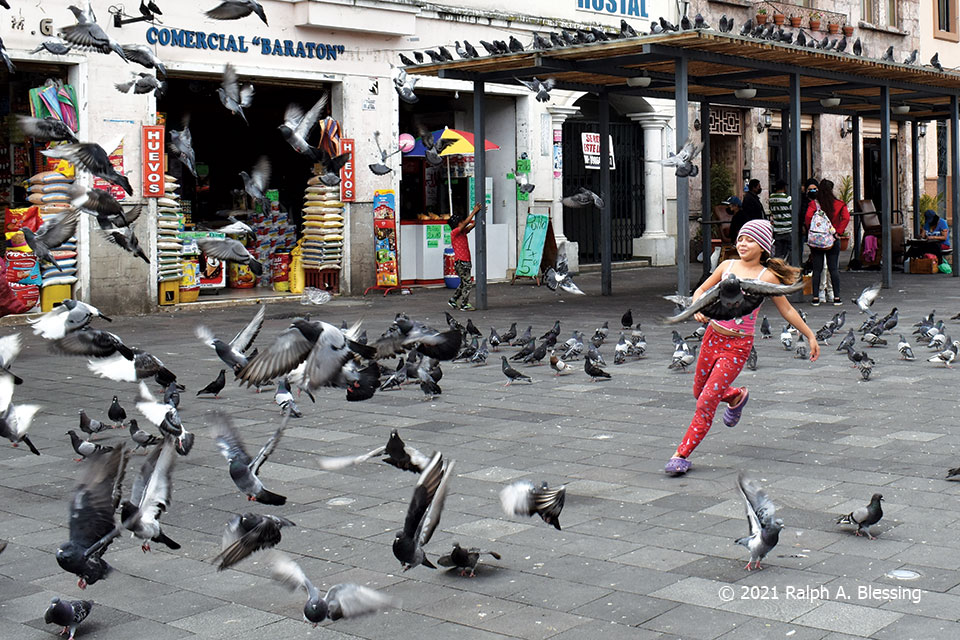Ecuador
Republic of Ecuador República del Ecuador Western South America AREA 109K mi2; 284K km2 ARABLE 4.7% POP 18.3M (167/mi2; 65/km2) GOV’T Presidential republic CAPITAL Quito (2M) GDP/CAPITA $14,500 UNEMPLOYMENT 3.4% IN POVERTY 25% LIFE EXP 75 years MEDIAN AGE 28 yrs INFANT MORT 11/1K live births (121st) LITERACY 94% INTERNET USERS 73% LANGUAGES Spanish (official), Quechua, other indigenous languages RELIGIONS Roman Catholic 68%, Protestant 19% (Evangelical 18%, Adventist 1%, other Protestant), Jehovah's Witness 1%, other 2%, none 8% HEALTH 8.5% of GDP EDUCATION 3.7% of GDP (128th) MILITARY 2% of GDP (78th) PCVs 1962–present CURRENT: 110, TTD: >6,700 |  Ecuador Cuenca is a colonial gem of a city in southern Ecuador whose historic center includes a handful of popular "indoor-outdoor" markets. The 9th of October Market caters especially to small-scale farmers who come to purchase chicken feed and other farming necessities, as well as everyday household goods. Others come seeking a spiritual cleansing by a curandera, or healer, in an indigenous tradition that seeks to cure emotional trauma, stress, and other ailments. Another way to relieve stress-and to enjoy market day!-is by chasing the pigeons that flock to the plaza to feast on the chicken feed inevitably spilled out in front of the farm supply vendors. Ralph A. Blessing © 2021 | PCV Panama 1969-1970 Community Development | Ecuador 1974-1978 Health Education Materials Production | DC Headquarters 1979-1986 Evaluation & Placement |
Adult Books

By Laura Resau & María Virginia Farinango
2011, YA
Summary:
This coming-of-age story is about a girl taken as a slave who ends up on a journey of self-discovery. She has a tumultuous upbringing in an indigenous peasant family in Ecuador. She is sent to live with a mestizo family (the Spanish upper class) for eight years as their nanny and maid. While the living conditions are an improvement over her family's small farm, she endures physical and verbal abuse and is denied an education. Narrating in a singular, authentic voice, Virginia dreams of escape, but her broken identity leaves her directionless. Along the way, though, she employs her imagination, persistence, and hard-won wisdom to recover her strength and freedom. The protagonist grapples with the enormous sociocultural gap between the indigenous people and the mestizos. The hallmark of this book is strong character development set in a complex and polarized social setting.
Editorial Reviews:
From Booklist
*Starred Review* In a desperately poor Andean village in Ecuador, 7-year-old Virginia is sold off by her indigena (Indian) parents as a servant to an academic, mestizo family. In her new home, the wife beats her, the husband gropes her, and she is insulted as a longa tonta (stupid Indian). Still, she teaches herself to read and write and begins to perform science experiments in secret. Then, when she is 12, she finally gets a chance to return to her parents: But does she want to? And do they want her? Virginia does travel back to her indigena family, but there is not the expected sweet reunion. Ashamed of her illiterate parents and bitter that they gave her away, Virginia is uncomfortable in the family's mud-walled shack, where she cannot speak the language and hates the hard work. Could she go back to being enslaved in the mestizo family's clean "prison"? Rooted in Farinango's true story, the honest, first-person, present-tense narrative is occasionally detailed and repetitive, but it dramatizes the classic search for home with rare complexity and no sentimentality or easy resolutions. Virginia's conflicts with her birth parents and her employers are heartbreaking, even as she finds a way to attend school and shape a more hopeful future. A moving, lyrical novel that will particularly resonate with teens caught between cultures. Grades 8-12. -- Hazel Rochman
Starred Review, Booklist, February 15, 2011:
"A moving, lyrical novel that will particularly resonate with teens caught between cultures."
Starred Review, Publishers Weekly, May 9, 2011:
"The authors' candid narrative richly depicts Virginia's passage from a childhood filled with demoralization to a young woman who sees her life through new eyes."
Starred Review, School Library Journal, June 2011:
"This is a poignant coming-of-age novel that will expose readers to the exploitation of girls around the world whose families grow up in poverty."
Kids' Books

By Edna Iturrald; translated by Jessica Powell
Publisher: Simsbury, CT: Mandel Vilar Press, 2018
Format: 114 pgs; Illus, maps
ISBN: 979–1-942134-60-2
Age Range: 8-12 yrs.
Summary:
A collection of twelve short stories about each of Ecuador's six remaining Amazon indigenous groups, told from the point-of-view of the indigenous children themselves. In simple language, the stories explore the culture, customs and ancestral wisdom of the indigenous groups living in the Ecuadorian Amazon, highlighting their collective love, respect and care of the natural world. These stories portray the way of life of the people who live in Ecuadorian Amazonia known for its forest, exotic animals, and indigenous towns.
Films

Production: Somewhere on Earth Series
Genre: Free Documentary
Run Time: 52 minutes
Music
Alex Ponce: Plan v2
Recipes
Mote Pelado (Andean Hominy)
Llapingachos Con Aji De Maní/ Ecuadorian Potato & Cheese Patties with Peanut Sauce
Aceite O Manteca De Color / Achiote-Infused Oil Or Lard
Aji De Mani / Ecuadorian Peanut and Milk Sauce
Ecuador Cultural Resources




